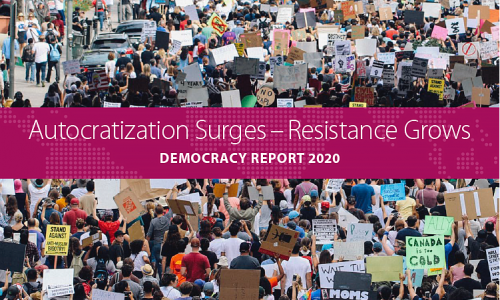
MAIN FINDINGS
- Autocratization – the decline of democratic traits – accelerates in the world: for the first time since 2001, autocracies are in the majority: 92 countries – home to 54% of the global population. Almost 35% of the world’s population live in autocratizing nations – 2.6 billion people.
- EU has its first non-democracy as a member: Hungary is now classed as an electoral authoritarian regime.
- Major G20 nations and all regions of the world are part of the “third wave of autocratization”: autocratization is affecting Brazil, India, the United States of America, and Turkey, which are major economies with sizeable populations, exercising substantial global military, economic, and political influence. Latin America is back to a level last recorded in the early 1990s while Eastern Europe and Central Asia are at post-Soviet Union lows. India is on the verge of losing its status as a democracy due to the severely shrinking of space for the media, civil society, and the opposition under Prime Minister Modi’s government.
- Pro-democracy resistance grows from 27% in 2009 to 44% in 2019 amidst the autocratization surge. During 2019, citizens in 29 democracies mobilized against autocratization, such as in Bolivia, Poland, and Malawi. Citizens staged mass protests in 34 autocracies, among them Algeria, Hong Kong, and Sudan.
Find the full report here: https://www.v-dem.net/media/filer_public/f0/5d/f05d46d8-626f-4b20-8e4e-5...
Understand more through the on line videoseries:
https://www.youtube.com/channel/UCag2SX-W1CJ9hML712qOR-Q
About V-Dem
https://www.v-dem.net/en/v-dem-institute/about-institute/
Varieties of Democracy (V-Dem) is a new approach to conceptualizing and measuring democracy. We provide a multidimensional and disaggregated dataset that reflects the complexity of the concept of democracy as a system of rule that goes beyond the simple presence of elections. The V-Dem project distinguishes between five high-level principles of democracy: electoral, liberal, participatory, deliberative, and egalitarian, and collects data to measure these principles.
With six Principal Investigators (PIs), seventeen Project Managers (PMs) with special responsibility for issue areas, more than thirty Regional Managers (RMs), 170 Country Coordinators (CCs), Research Assistants, and 3,000 Country Experts (CEs), the V-Dem project is one of the largest social science data collection projects focusing on research.
The Headquarters is based at the V-Dem Institute, the Department of Political Science at the University of Gothenburg, Sweden.
In the early years of Varieties of Democracy, the Kellogg Institute for International Studies at the University of Notre Dame was one of the two founding institutions and institutional homes for the project. The Kellogg Institute for International Studies at the University of Notre Dame was an instrumental part in building and establishing V-Dem. It was initially responsible for data collection in the Western Hemisphere, hosted workshops, and funded many students who worked on the project, as well as one of the Project Coordinators. In addition, the Center for Research Computing at Notre Dame developed the research database and the web interfaces that were used from 2011 to fall 2014. As the project grew, the V-Dem Institute in Gothenburg progressively assumed responsibility for these functions and became, in effect, the headquarters for the project. Recognizing the shifting roles, in 2018 the Kellogg Institute formalized its current role as the V-Dem Regional Center in North America, which supports research projects using V-Dem data and hosts speakers and occasional conferences and workshops.










Add new comment